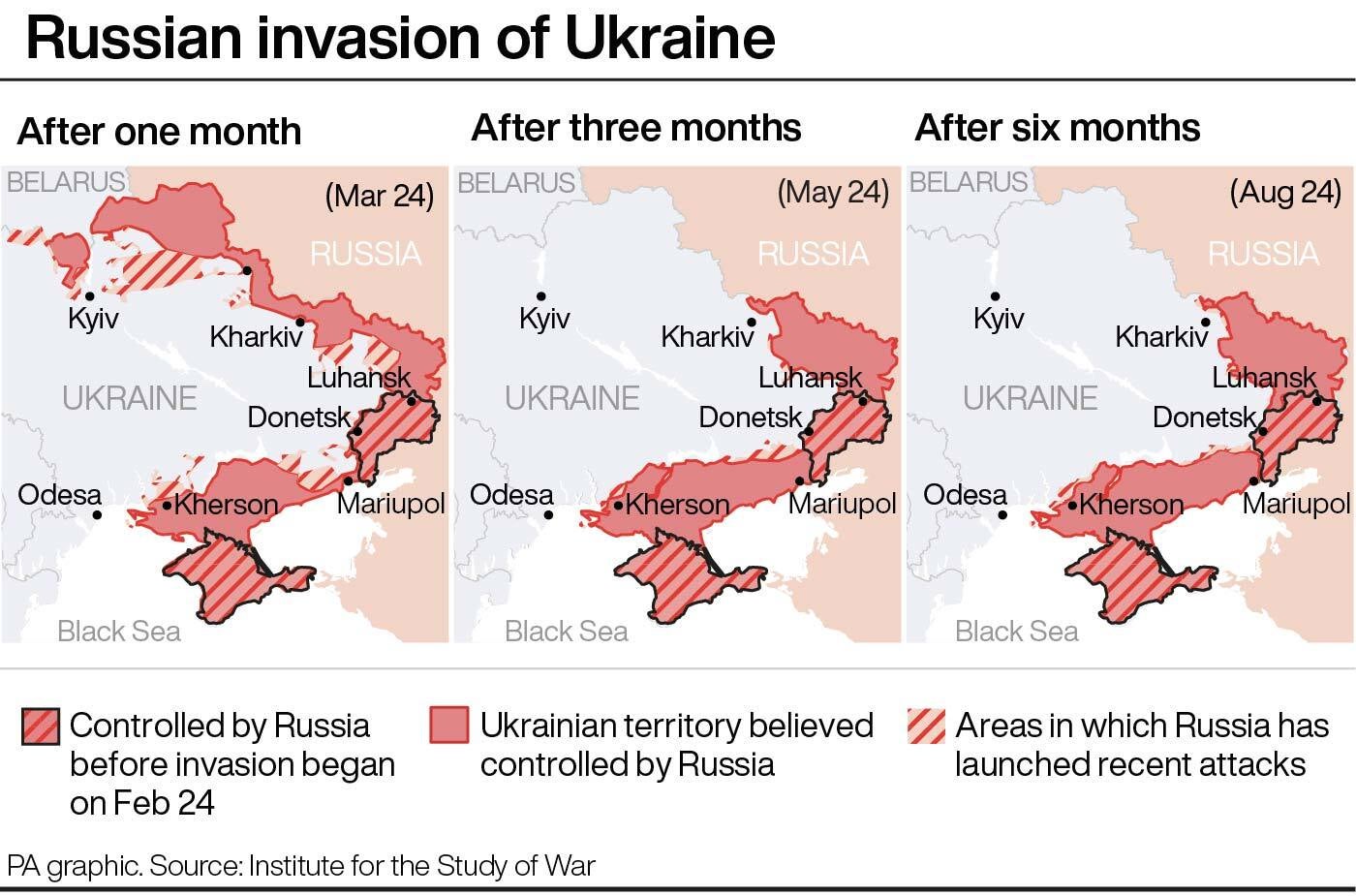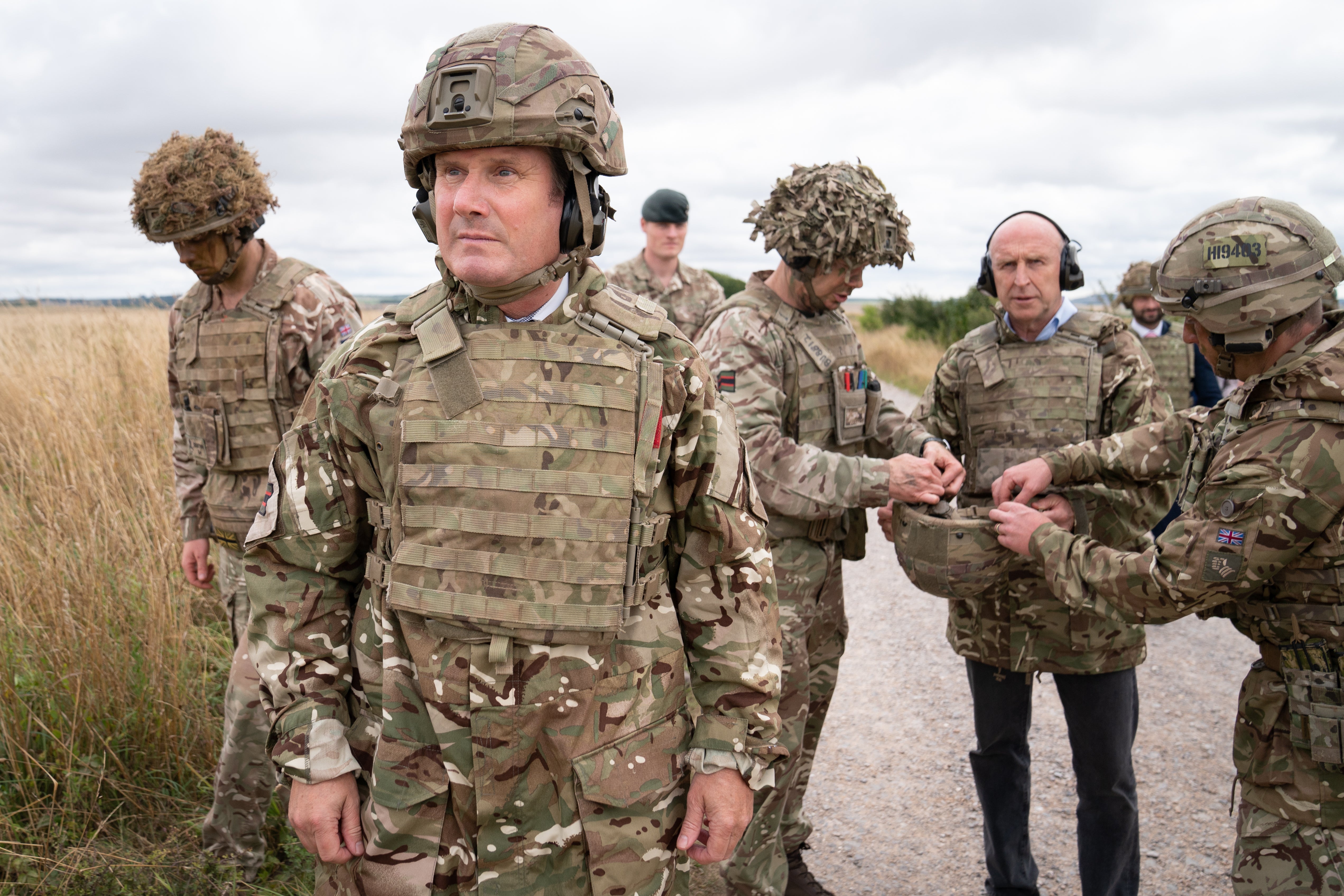
High energy prices are a pain that UK households must endure as part of the effort to resist Vladimir Putin, Boris Johnson said during a surprise visit to Kyiv.
The Prime Minister said “if we’re paying in our energy bills for the evils of Vladimir Putin, the people of Ukraine are paying in their blood”.
Making his last trip to Ukraine before leaving office, Mr Johnson set out a further £54 million of military aid, including drones to target Russian forces.
His meeting with President Volodymyr Zelensky came on Ukraine’s independence day, marking 31 years since breaking from Moscow’s rule following the collapse of the Soviet Union.
Mr Johnson said Russian President Mr Putin had been “insane” to launch the invasion and the resistance had been like “an indomitable Ukrainian boxer”.
The conflict, and the economic sanctions imposed on Russia, have contributed to soaring global gas prices which have driven up household bills.
The BBC reported that Mr Johnson warned that British households will “have to endure the cost-of-living crisis” in order to counter Russia’s “inevitable manipulation of energy prices”.
The Prime Minister will leave office on September 6, the day after either Liz Truss or Rishi Sunak emerges as the victor in the Tory leadership contest.
He stressed that “the UK will continue to stand with our Ukrainian friends” and used his meeting with Mr Zelensky to set out a further package of military aid, including 2,000 drones and loitering munitions.
He also received the Order of Liberty, the highest award that can be bestowed on foreign nationals, for the UK’s support for Ukraine.
Mr Johnson said: “For the past six months, the United Kingdom has stood shoulder-to-shoulder with Ukraine, supporting this sovereign country to defend itself from this barbaric and illegal invader.
“Today’s package of support will give the brave and resilient Ukrainian armed forces another boost in capability, allowing them to continue to push back Russian forces and fight for their freedom.”
The support includes 850 hand-launched Black Hornet micro-drones – smaller than a mobile phone – which can be used to provide live feeds and still images to troops, particularly important in urban warfare.
It also includes larger drones and loitering weapons, which can be used to target Russian vehicles and installations.

The UK is also preparing to give mine-hunting vehicles to operate off the coast, with Ukrainian personnel being trained in their use in UK waters in the coming weeks.
Mr Zelensky said Mr Johnson was a “great friend of Ukraine”.
Meanwhile, Defence Secretary Ben Wallace said the UK could “toughen up” its visa conditions for Russians, but expressed doubt that a total travel ban was the solution.
Mr Wallace’s comments come as Finland, Estonia and the Czech Republic have called for Brussels to implement an EU-wide ban on new tourist visas for Russians to enter the Schengen free travel area as punishment for Russia’s war against Ukraine.
Mr Zelensky had first urged the visa ban in an interview with The Washington Post earlier this month, saying Russians should “live in their own world until they change their philosophy”.
Both the EU and the US have rebuffed Ukraine’s demand so far.
Speaking to BBC Radio 4’s Today programme, Mr Wallace said: “I certainly think we can toughen up the conditions of our visas. I am not sure whether an outright ban is the right way.
“I think that’s a matter for the Home Secretary to look at. But I don’t like, and I’m sure none of your listeners like, watching oligarchs’ wives or indeed Russian senior officials’ wives enjoying themselves in Greece or the south of France or on super yachts around the world while their army is committing war crimes in Ukraine.”
Despite the war in Ukraine reaching its sixth month and fears the West might be losing interest, the Defence Secretary appeared optimistic.
On the EU’s resolve, Mr Wallace said “I don’t see any waning” of support.
He also claimed Russia is in a “very fragile position” at the moment, explaining its advance can be measured “in metres per week, not miles”.
On whether Ukraine is realistically in a position to retake the territory that Russia still holds, Mr Wallace said: “I think Ukraine is getting itself into that position.”
Labour leader Sir Keir Starmer paid a visit to Ukrainian and British Army personnel at Salisbury Plain.

He said: “My mission, my message to the Ukrainian people, to our troops, our Nato allies, is that on the issue of defending Ukraine against Russian aggression, we stand united.
“We will not be divided politically in the United Kingdom on this and I’ve been able to deliver that message first-hand amongst this very, very impressive training.”







